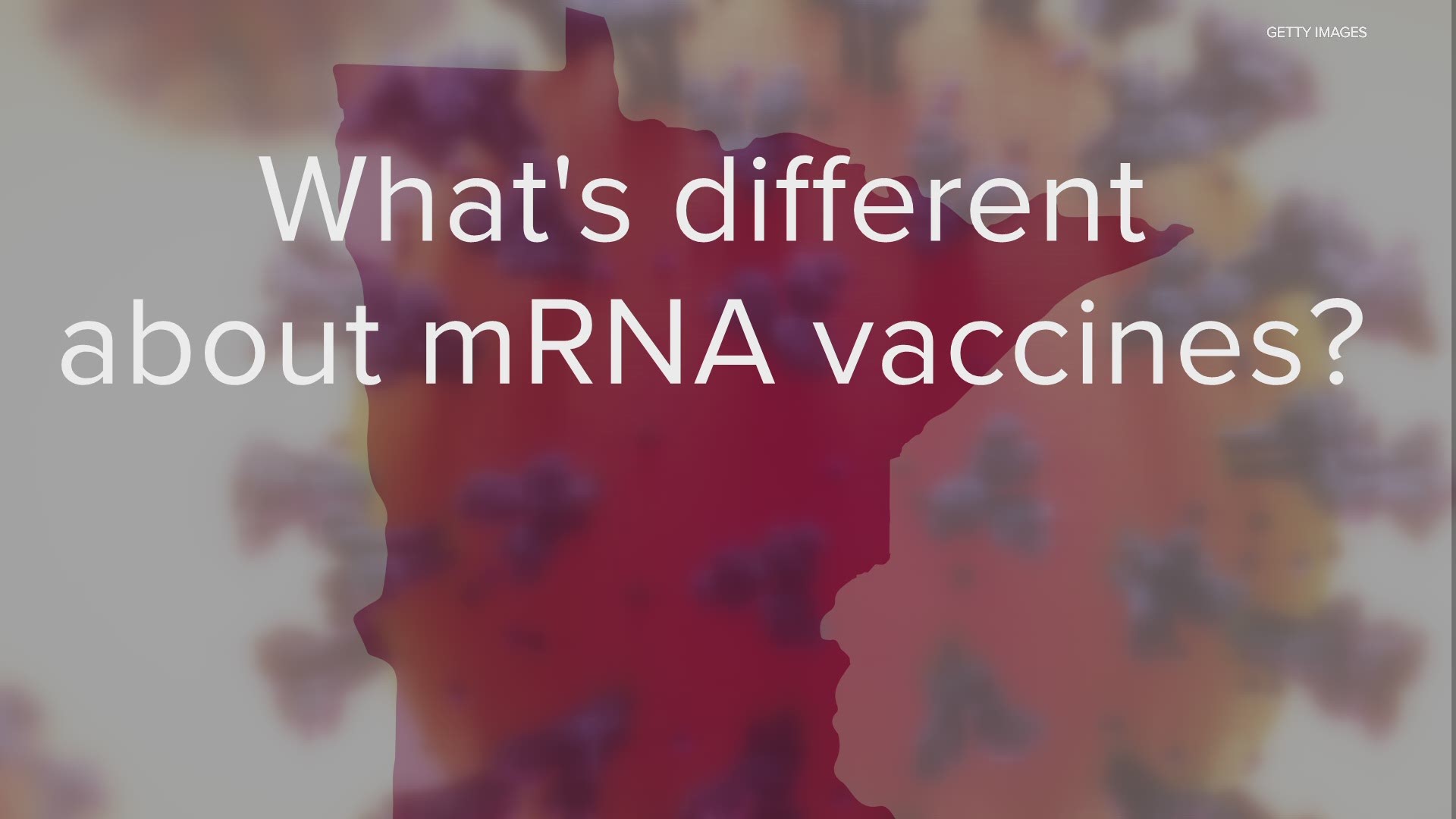GOLDEN VALLEY, Minn. — What's different about mRNA vaccines than other types people normally get?
Instead of being a dead virus or weakened virus going into our bodies, like with the flu, polio or mumps shots, the messenger RNA vaccine tells our bodies to make one kind of protein the coronavirus uses to attach to our cells and then build antibodies for that protein so it can’t attach.
There is no actual virus in the mRNA vaccine and no potential to get COVID-19 from it.
Also, mRNA is way cheaper and faster to make, which is good in a global pandemic. There's no need to incubate viruses in chicken eggs; there’s no need to grow a virus at all. Scientists, like Marc Jenkins, Director of the Center for Immunology at the University of Minnesota say the only drawback with mRNA is that it is fragile. These molecules are designed to deliver a message and then break down. So, this is why they must be kept in temperatures below -70 degrees F.
“It’s kind of like Snapchat,” said Patsy Stinchfield, a nurse practitioner and senior director of infection prevention at Children's Minnesota. “Our cells are like ‘hey turn this on, turn this off,’ and the message goes away. Or like a sticky note that gets placed. ‘Don’t do this. Kill that. Work on that.’ In this case it is sending in a message that says ‘Here is a new protein. It’s a bad player. Make antibodies against it.’"
How long until you get protection from the vaccine?
After a patient gets the shot, the body will start the process of making antibodies right away. However, the process of building up those antibodies takes time.
“After the first dose you will be about 50 percent protected. After the second dose, which is 21 days later, you will be upwards of 94, 95% protected,” said Stinchfield.
In total, immunity happens at a minimum of 7 days after the second dose. How long it lasts is still unclear.
Can kids take the COVID-19 vaccine?
No, not yet. But testing for a pediatric vaccine is being done right now, part of it here in the Twin Cities.
“We are very anxious to get a vaccine to our kids. We are projecting closer to summertime for the studies to be done and robust enough to be given to children,” said Stinchfield.
Is it safe and/or normal to ask for youth to volunteer in a vaccine trial?
“Children in research is a very normal thing that we do. We do it and have seen great strides in reducing pediatric cancers because children have been in trials. Flip it around. How ethical is it to not protect children? How ethical is it to give them a vaccine we haven't studied in them? So, we are trying to do this carefully and thoughtfully and it's going to be the best thing to vaccinate all of us,” said Stinchfield.
Do you have to take the same brand of vaccine for both doses?
Yes. The Pfizer and Moderna versions of the vaccine have slightly different doses of mRNA in them. They work the same way, but you shouldn't interchange them, according to the CDC, which says it still doesn’t know how the two vaccines would react taken together.
Also, the doses of the Pfizer vaccine are recommended to be taken three weeks apart. The Moderna vaccine is recommended to be taken four weeks apart.
How will clinics, pharmacies and hospitals know who got who received a vaccine?
The State of Minnesota will keep track of who got the vaccine, when they got it, and which type they received through the registry.
“We will put people into our local Minnesota immunization registry and keep track of it that way. Pharmacies, hospitals, clinics all have access to that. So it will all be recorded,” said Stinchfield.
She said patients can opt out of the registry as well.
Does a new coronavirus variant found in the U.K. mean the vaccine won't work?
Not necessarily. Most viruses mutate. Some more than others. Scientists say this isn't a big surprise. At this point, there is no research indicating this variant is more or less contagious or deadly, or if the vaccine won't work against it. Scientists are keeping an eye on it.

